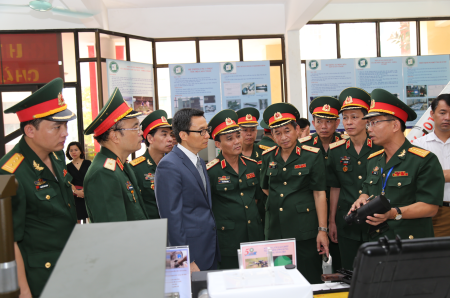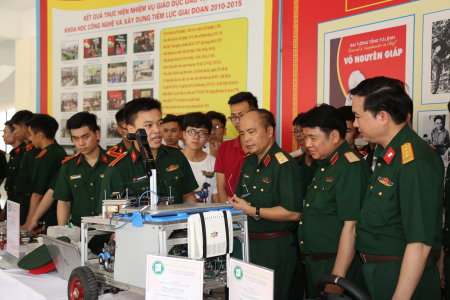The Military Technical Academy’s training work amidst the 4th industrial revolution
The 4th industrial revolution has been impacting on various aspects of the social life, including education and training. As a top education and research centre of the Military, the Military Technical Academy (MTA) both has many chances and faces numerous challenges and issues that need to be handled.
The MTA is tasked with training technical cadres at college and postgraduate levels, organizing scientific research and consultation, and providing scientific and technological services for defence, security, and socio-economic development. In recent years, to implement the guidelines on a fundamental, comprehensive reform in training and education under the 11th Party Central Committee’s Resolution 29-NQ/TW, the MTA has set a goal of “building itself into a top scientific, technical, and technological research centre of the country, basically integrating with the system of colleges in the region and gradually integrating with other colleges around the globe, and providing high-quality multi-sectoral training in accordance with the national and international frameworks of qualifications by 2030”. To achieve that goal, the MTA has attached great value to adopting the learner-centred teaching method, building a contingent of high-calibre teachers and researchers, modernizing its facilities, and making a positive change in the quality of training. In the past three years, over 90% of its cadets have graduated with credit and distinction. Yearly, the MTA always wins top prizes in technological competitions across the country, which asserts its potential for the applied research.
 |
| Deputy Prime Minister Vu Duc Dam visiting the MTA and inspecting its training and research work |
The 4th industrial revolution has been greatly impacting on the system of education and posing high requirements for the training, research, and college-level governance model. In spite of its tireless efforts, the MTA has yet to keep pace with the development trend. Basically, its training programs have yet to meet the requirements set by the 4th industrial revolution; there is a dearth of teachers and researchers in some fields, such as new material, nanotechnology, smart production system, and 3D printing technology; the level of foreign language and information technology has yet to be equal; online learning is limited; its facilities have yet to be adequate or synchronous.
To settle those weaknesses and take the initiative in applying the achievements of the 4th industrial revolution within the Military and building the MTA into a smart and top college on regional and international scales, in our opinion, we should adopt the main measures as follows.
First, stepping up the work of propagation to raise cadres, teachers, and cadets’ awareness of the impacts made by the 4th industrial revolution on the MTA’s training work. At present, its cadres, teachers, and cadets’ awareness of the 4th industrial revolution’s nature, particularities, and impacts on the training task has yet to be really sufficient. The role and responsibility of some staff members towards the reform in the training work have yet to be valued properly. Thus, the MTA should focus on introducing directives, decisions, and action plans for the 4th industrial revolution, particularly the MTA’s Action Program 2287/CTHĐ-HV, dated July 9th 2018, on “meeting the requirements set by the 4th industrial revolution in the period of 2018-2025 and beyond” to all staff members and cadets. Doing so will help its cadres and teachers fully understand the 4th industrial revolution’s nature, development trend, requirements, and impacts on its training work as well as models in response to the 4th industrial revolution at colleges both inside and outside the Military so that they could build up their motivation, determination, and responsibility in the process. To achieve the effective, it is necessary to flexibly adopt various methods of propagation and education in accordance with reality and each group of staff members and cadets. In addition to assigning the tasks related to the 4th industrial revolution to each cadre and teacher, it is essential to organize talks, dialogues, and knowledge contests in reference to the 4th industrial revolution for cadets. At the same time, it is important to hold special refresher courses and scientific conferences and post articles about this area on the MTA’s Portal Web for its staff members and cadets to study.
Second, adjusting and supplementing the training programs and methods properly. To bring into play the achievements of the 4th industrial revolution within the Military, it is important that the personnel have comprehensive knowledge and skills to adapt themselves to continuous changes in their work’s goal and requirements. Therefore, the MTA’s training programs and methods must be changed appropriately. The Academy should reduce the number of subjects, increase the quantity of integrated, multi-sectoral subjects, and closely combine training with scientific research so as to meet the requirements for the exploitation and mastery of modern materiel. Significance should be attached to developing the training programs with multi-sectoral research orientation, such as mechatronics, control and information technology in technical systems, flying control system, automated command system, cyberspace operations on a par with top colleges in the region. In this regard, consideration should be given to increasing the duration for practise and experimentation and providing cadets with instructions on self-studying, self-updating the knowledge, and self-seeking scientific topics in the first years at the MTA in order to improve their creativity. Moreover, it is vital to formulate short-term training programs and special topics of information technology, digitalize documents, build the database and virtual labs, and create a friendly technological foundation for cadets to study online and organize discussions about the academic knowledge via the Internet of Things, meeting the military technical cadres’ demand for study.
 |
| Introducing the MTA’s research products |
In addition, it is necessary to employ the 4+1 model which associates training with the first title. More specifically, in the 5-year training program intended for cadets, the MTA will provide basic education for them in their first 4 years and specialized education in their final year according to the demands of institutions, colleges, factories, and combat readiness units. This model will ensure military engineers’ basic, deep knowledge and specialized skills to meet their task requirements and create a favourable condition for them to access the 4th industrial revolution. Besides, in order to make cadets expert and creative, the teaching method should be changed. Teachers should serve as designers and consultants, arouse learners’ creativity, both deliver lectures and provide learners with instructions on the methods of studying, searching documents, and undertaking scientific researches. Meanwhile, learners should equip themselves with necessary skills in self-studying and self-updating the knowledge.
Third, building and making a contingent of teachers and managerial cadres capable of the task requirements in the new condition. The 4th industrial revolution with a combination of virtual systems and the Internet of Things is really challenging the role of men, including teachers. Teachers are now mainly tasked with creating a favourable condition for learners to study under a positive and creative approach. Thus, to build and make a contingent of teachers and managerial cadres capable of the task requirements, the MTA should develop a master plan and improve teachers and managerial cadres’ comprehensive knowledge, hands-on experience, teaching method, foreign language and information technology level, and method of scientific research. At the same time, it should create a standard, united, disciplined working environment to arouse their talent, creativity, and dedication to their job. It should continue effectively implementing the plan on standardizing foreign language level and skills in using information technology among teachers and cadres, the project on developing a contingent of professors and associate professors, and the procedures for training young teachers, helping them easily exploit the information and acquire new knowledge in the international integration context. It should further deploy teachers to hold positions at units and organize more delegations to visit and learn about new materiel and technical work at units within the Military.
Fourth, upgrading and building modern, inter-connected technical establishments in accordance with the tasks of training, research, trial, and technology transfer. To execute the Program 2287/CTHĐ-HV, the MTA should build a plan on upgrading and developing technical establishments, particularly for the 1st-group weapons and equipment. A focus should be placed on upgrading specialized equipment for the forces which are moving forward to modernity. Priority should be given to making investments in the labs for artificial intelligence, big data, robotics, and new materials in order to foster the development of the MTA’s research works and products of international value. Besides, it is important to organize a system of online and open labs so that cadets could carry out basic experiments on the Internet or under the personal plans of use.
The MTA’s establishments for trial and technical support should be upgraded in line with the programs and targets of technical work and the Resolution 06-NQ/TW on building and developing defence industry. Priority should be given to making investments in new majors, modern equipment for robotics, new materials, and 3D printing as well as pieces of software for cloud computing, artificial intelligence, information safety, mechatronics, technical physics, and nanotechnology. Importance should be attached to making investments in semi-natural modern-materiel simulation models, pieces of simulation software, system of audio-visual equipment, and smart connection at the specialized classrooms with a view to building a large database of semi-natural, virtual practice exercises that could be shared on the intranet. Besides, it is necessary to construct several key labs with modern equipment on a par with those at the top colleges regionally and globally in order to provide high-quality services of training, scientific research, and technology deployment and achieve a breakthrough in conducting nationally representative and international-level researches. Doing so will help encourage top scientists from colleges both at home and abroad to take part in teaching and research at the MTA and provide an important basis for it to train military technical cadres and meet the requirements set by the 4th industrial revolution.
Sr. Col. Nguyen Minh Thang, PhD
Lt. Col. Tran Quang Huy, MA